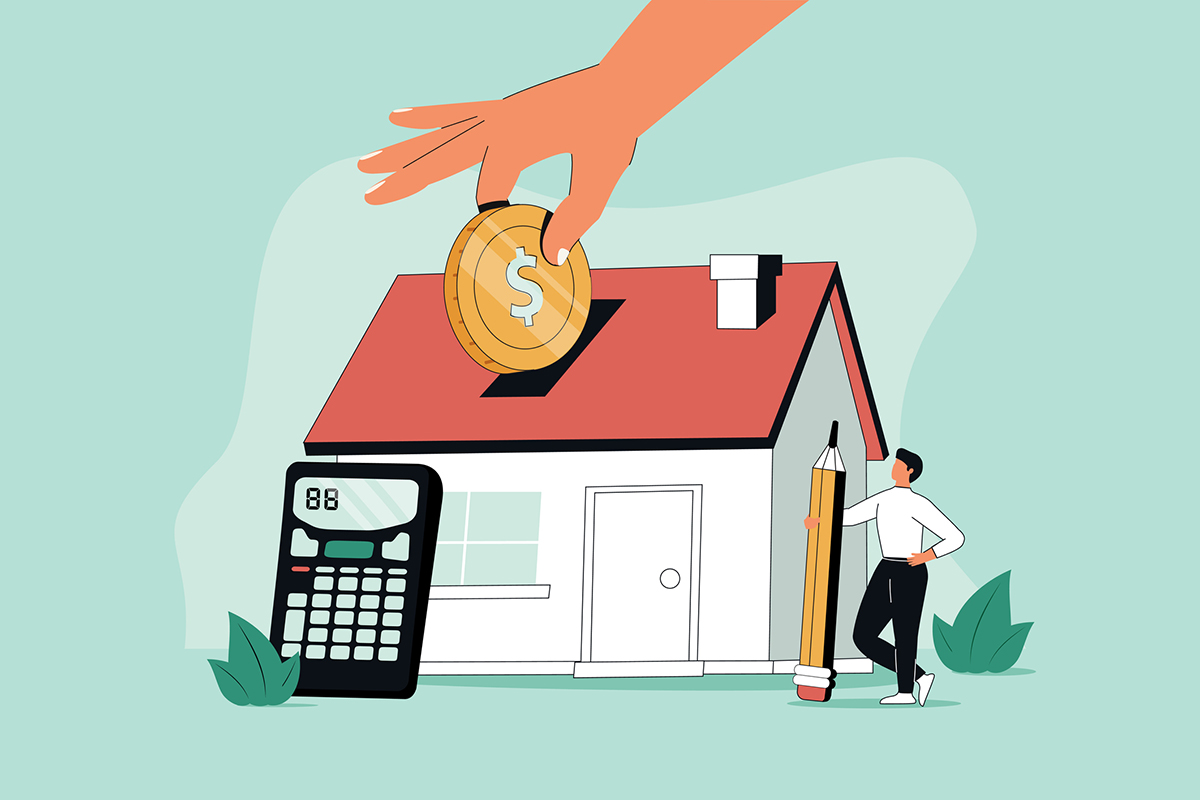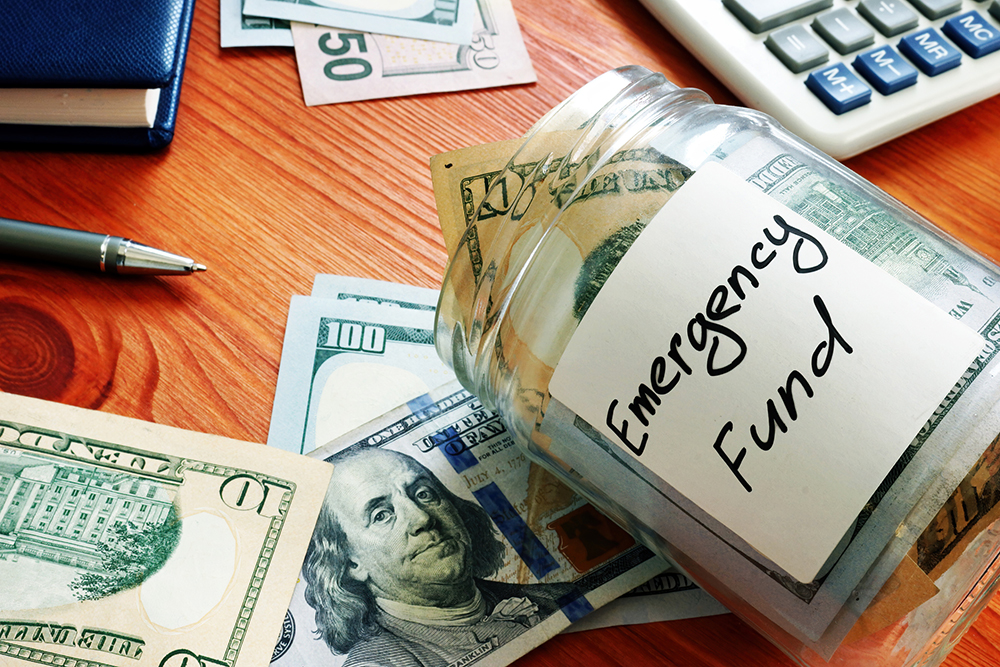As a homeowner with bills to pay, you’ve probably done some searching for personal finance tips. But what is personal finance, anyway? And what does personal finance mean for homeowners? Let’s take a look at what spending, saving, and budgeting mean if you own a home.
11 Financial Tips for Homeowners
- Invest 10% of Your Income
- Stick To a Personal Budget
- Maximize Credit Card Rewards
- Purchase Insurance
- Create an Emergency Fund
- Set Bills on Autopay
- Research Ways To Save Money
- Consult With a Tax Planner
- Pay Off Your Debt
- Refinance Your Debt Periodically
- Evaluate Your Goals
Personal finance means managing your own money for the present and the future – how you spend, save, and invest your money. You might think that financial planning is easier if you have a six-figure salary, but that’s not necessarily the case. As many people come to realize, financial security is not entirely about how much money you make. In fact, it’s more often than not about how much money you keep. Without budgeting, tax planning, saving, and investing for the future, you could find yourself living paycheck to paycheck even if you’re a tenured professor or a full partner at a law firm.
Personal finance topics are getting a lot more traction these days due to inflation concerns. At the time of this article, inflation has risen to 8.54%. This means that every dollar you earn has 8.54% less purchasing power, which makes it harder to keep the fridge fully stocked. To make matters worse, the price of gas has steeply increased as well, doubling, tripling, and even quadrupling in some parts of the country. Consumers everywhere are feeling the pinch as they pay more for goods and services.
If you’re a homeowner, there is some good news there. Most mortgage loans in the United States are fixed rate mortgages, which means that the interest rate doesn’t change over time. This is in contrast to a variable rate mortgage, where the interest rate fluctuates based on market conditions. If you’ve been making the same mortgage payment every month, you’re much better off than someone who is looking at annual rent increases in addition to our inflationary climate.
Despite the advantages of being a homeowner, you still need to have a financial battle plan. Expenses never stop. In addition to fixed expenses like your mortgage payment and your utility bills, there are variable expenses like groceries, gas, and entertainment. Without a strong grasp of personal finance best practices, you could find yourself spending too much on entertainment and not having enough for gas or groceries.
Some consumers who don’t develop good spending, saving, and investing habits may end up having their home foreclosed on or having to file for bankruptcy. Even if you never have to experience either of these events – if you don’t budget, plan, and strategize what to do with the money you earn, you may not get to enjoy life as much as you would like to. You may have to cut back spending on life events like your child’s wedding or that dream vacation. Of course, the reverse is also true. If you learn and implement personal finance tips, you can have your cake and eat it too.
Top 11 Financial Tips for Homeowners

1. Invest 10% of Your Income
This is easier to do than you think, especially if you have a fixed salary and work at a company that will allow you to allocate a portion of your paycheck into an IRA. All you need to do is have 10% of your paycheck automatically deposited into your retirement account, whether that account is with your company or elsewhere. Some employers will even provide a matching contribution that ranges from 1-5% of your paycheck.
Imagine that…every month storing 15% of your paycheck into a retirement account for the future! And if that retirement account grows at even a modest rate of 8% per year, you’re looking at some exponential growth. For example, if your salary is $70,000 and you put aside 10% of that per year and have 5% of that matched – after just three decades you’d be a millionaire. That’s just one example amid many iterations. But no matter your situation and the numbers you plug into the formula, you’ll be amazed at how compound interest snowballs your investments, especially with a solid 10% monthly contribution.
2. Stick To a Personal Budget
It can be difficult for some people learning how to make a personal budget because they find it very restrictive. After all, who wants to tell themselves how many times they can eat at a restaurant every month, how often they can grab a cup of coffee on the road, and whether they can get chicken or beef at the grocery store?
Without a personalized budget that takes into consideration your income, your needs, and your plan for the future, you run the risk of overspending and putting yourself into financial straits. Budgeting requires discipline, but it doesn’t have to be as constructive as it sounds. You can build rewards, treats, vacations, and spontaneous moments into your budget, for example, by setting aside however much money every month for a surprise lunch or article of clothing.
3. Maximize Credit Card Rewards
One way to make budgeting less painful is to maximize the opportunities afforded by credit card rewards. Credit card rewards typically involve providing points or cash back for every dollar spent. Some cards reward you more for certain spending categories like gas. There are cards out there that will give you 3% cash back on gas and grocery store purchases.
If you’re spending $1,000 or more with your credit card every month, you’re potentially looking at an automatic $30 back every month, or $360 for the year – which might be a car payment or an electric bill. If you can put your recurring charges on credit cards that issue rewards, you’ll also be getting cash back on expenses you have to pay anyway. Certain banks will also provide additional percentages if you have a certain amount of equity with the bank in your checking, savings, and investment accounts, which can amplify the rewards you receive.
4. Purchase Insurance
You don’t know what you’ve got until it’s gone, they say. Unfortunately, this platitude is not very comforting when you lose money. Years or even decades of hard work can go out the window if an unexpected event occurs, especially one that requires medical attention or involves irreparable damage to your personal property.
As a homeowner with a mortgage, your lender has likely required you to purchase homeowners insurance. If you have paid off your home, it’s still something you should have. It sounds like a downer, but you never know when a falling tree, exploding pipe, or kitchen fire might damage your home and force costly repairs.
You never know what health challenges might occur, or if your vehicle will be damaged in an accident. As a general rule, you should purchase an insurance policy for everything of significant value in your life. That includes your home, your car, certain valuables, and even your own health and life. Having good health insurance and life insurance is one of the best pieces of financial advice.
5. Create an Emergency Fund

There are smaller scale emergencies that occur that may not be covered by an insurance policy. For these situations, it’s important to set up an emergency fund. It’s good to have some money set aside so that a reduced income stream or sudden surprise expense does not force you to dip into investments or deviate from your plan.
As for how much this emergency fund should be, that depends on you and your circumstances. Many experts suggest having 3-6 months of your salary set aside in case of a job loss or some unforeseen circumstance. To be fair, setting aside this much money in addition to allocating a percentage toward the future may be difficult. But keep in mind that even setting aside $500, $1,000, or a few thousand dollars into a rainy day fund never hurts.
For homeowners, an emergency fund can be especially important. If the emergency requires you to dip into your income stream, you could jeopardize your mortgage payment, which could in turn have repercussions.
6. Set Bills on Autopay
One way to eliminate financial headaches is to set as many bills as you can on autopay. This includes fixed expenses like your mortgage payment, insurance payments, and utility bills. It can be a significant weight off your shoulders if you don’t have to worry about going online, mailing a check, or calling in to pay your bills each month.
Setting your bills on autopilot can help make sure they get consistently paid on time, which can mean less risk of penalties and fees that cost you additional money. Some service providers will offer a discount if you prepay for 6 months or a year (this is common with car and homeowner’s insurance policies). If you can select this option, it can save you additional money.
7. Research Ways To Save Money
If you’re on social media, you can follow accounts that share tips and videos about saving money. Sometimes, these tips might be life hacks you can do at home – for example, replacing incandescent bulbs with LED bulbs can save you $10 to $20 per year per light. You can learn about complex strategies, such as the difference between types of mutual funds, and whether you should invest in stocks, bonds, or both. You can also get tips for improving your credit score. If you have good credit, you will get loans with better terms, pay less interest, and save more money.
8. Consult With a Tax Planner

Never underestimate the power of meeting with a qualified accountant! There are a number of legal and helpful loopholes in the tax code that you can leverage to your advantage. This is especially true if you are self-employed or have investments that generate income.
A tax planner can help you figure out how to write off business expenses, and plan for the future with considerations like a reverse mortgage or a 1031 exchange. The tax code is extremely large and complex. Unless you know it well, you're probably not saving all the money you could be saving in terms of tax deductions and tax credits.
If a tax planner can double up as a financial advisor or refer you to one, this is even better. A financial advisor can take your personal information and life goals, and formulate an investment and retirement plan. Talk to a professional about creating a savings account like a Roth IRA for your future, and get help strategizing how much you’ll pay in taxes during retirement, so you won’t just have to live off Social Security.
9. Pay Off Your Debt
One of the biggest reasons you should pay off your debts is because of interest payments. These interest payments may not seem like much every month, but throughout a lifetime, they constitute a very significant amount. The sooner you can eliminate your mortgage, car loan, student loan, and credit card debts, the better.
There are also some types of debt that you should be careful to avoid, such as credit card debt. Credit card interest rates are higher than other loans – typically around 16% and upwards, whereas a home loan might have a 5% rate.
To make matters worse, many credit card companies will set your minimum payment at a certain percentage of the total balance, interest not included. This means that if you are only paying your minimums, you will end up paying interest on your interest. If you are wondering how to get out of debt, you must pay more than your minimum payment due.
10. Refinance Your Debt Periodically
Some debts are too large to pay off over the course of a few months or a few years, such as a home loan, car loan, or very large credit card balance. In these cases, you may want to periodically refinance your debt.
Refinancing your debt essentially means having a third party pay it off for you, and in exchange, you agree to a payment plan. Usually, this third party offers a more favorable interest rate and a longer loan term. So, not only do you pay less interest in the long run, but your monthly payments are lower as well. In the case of credit card debt, this type of consolidation is usually called a balance transfer.
You can transfer one or multiple credit card balances to a particular card offering a promotion, such as 0% interest for 12, 18, or 21 months. Once that promotion ends, you can transfer the balance somewhere else, wherever a similar promotion is being offered. In the case of larger loans like a car loan or mortgage, you will have to shop around from bank to bank and see which financial institution can offer you the best home refi. This could end up saving you hundreds every month and tens of thousands over a few decades.
11. Evaluate Your Goals

Effective financial planning requires examining your personal goals. Personal goals are often intrinsically bound up with financial goals. If you want your financial situation to improve, it can be very helpful to assess what is important to you and make some distinctions between wants and needs.
Many times, financial success can be achieved simply by maintaining reasonable living expenses and spending habits. For example, you may be hoping that a new car is on the horizon. But do you really need a BMW or Mercedes? Perhaps something less expensive would be better for your financial future. You will need to crunch potential numbers and see if certain choices will make your financial plan more difficult. A good financial advisor can help you with investment strategies and might advise you to downsize your goals or not pursue something just because you think it’s society’s standard.
This consideration is especially relevant to homeowners. The equity in your home can be leveraged through something like a HELOC (home equity line of credit). This would allow you to make large purchases like college tuition, a new car, dream vacation, or home renovations. The question that must be asked is whether it is worth it, and the answer can be found by evaluating your life goals.
Personal Finance Tips for Homeowners
There are a number of considerations that go into improving your financial life, especially if you are a homeowner. While these considerations are important for everyone, homeowners have some unique advantages and disadvantages when it comes to personal finance.
One advantage is that your housing expenses are set in place (assuming you have a fixed mortgage) and you know how much you’ll be paying every month. You don’t have to worry about the landlord increasing the rent.
On the flip side, your housing payment is set in stone and must be paid, otherwise, you could jeopardize your home. If you don’t budget carefully, have insurance to cover surprises, or overshoot reasonable life goals based on your income, you could find it stressful to pay your bills on time.
If you are a homeowner of a primary residence, fewer things are financially sweeter than paying off your mortgage early. The benefits of not having that monthly mortgage payment far outweigh the tax breaks you get on mortgage interest. With the money you save, you can accelerate your progress towards other goals, such as contributing a larger percentage of your income towards retirement.












